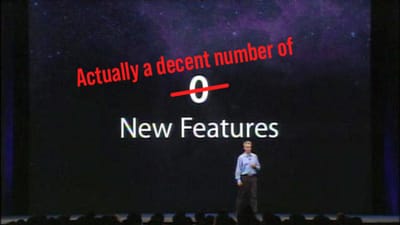Apple's App Store is a Changing
Apple had a surprise press release yesterday where they unveiled 3 changes to the App Store going forward. This was definitely a surprise, as we are less than a week away from the company's Worldwide Developers Conference, and these are the sorts of changes that would make perfect sense at that conference. Apple's hyping up their conference saying that they have so much to show next week, this just couldn't fit and they're telling us now.
Whatever the reason may be that they announced all this early, let's dive into each update.
1. Fast review times are now the norm
Developers have been experiencing much faster review times as of late, dropping from 7 days to less than 24 hours in a lot of cases. They've been excited, but with a little trepidation. "Is this a fluke? Will it last?" they asked, but Phil Schiller put our minds at ease when he confirmed that these zippy review times are the expectation going forward.
Schiller said they achieved this new speed by doing 3 things:
- New tools to review faster
- New team members
- New policies
Nothing specific about those reasons was given1, but to me it sounds like the app review team had been doing this since the beginning and their process had not changed much since 2008. I suspect they had a bunch of employees and middle managers who had been there a long time and were stuck in a mindset that things couldn't get better for X, Y, or Z reasons. It looks like that team has had a little churn under Schiller's watch and things are much improved.
Ultimately, this is an unabashed win for developers, customers, and Apple alike. App review is an important part of Apple maintaining a safe storefront, but anything that can be done to make sure that process is as fast as possible is a good change.
2. New subscription revenue share
Apple's 70/30 split of revenue in the App Store has been around since the beginning of the App Store. As the store has grown, people have started paying for content differently with in-app purchases and subscriptions, but the revenue split has remained the same. Apple didn't blow that out of the water, but it did make one key change that might shake up how you pay for some of your favorite apps in the future.
The change is essentially that if you have a customer who is subscribed to your app/service through the App Store, you get the same 70/30 split for the first 12 months, but after that the split goes to 85/15. For example, if you have a $10/month subscription, you get $7 and Apple gets $3 each month for the first year. If your customer keeps subscribing after the first year, you start to get $8.50 per month and Apple gets $1.50. From your customer's side, nothing has changed, but you're making more money as the developer.
Apple pitched this as a way for developers to make more money off their products and ensures that apps have a better business model that is sustainable. The paid-up-front pricing model is really dying out, and this could be a way for apps that used to use that model to switch to subscription pricing and continue making money.
I think this is a good move, and will push more developers into the subscription pricing model. When you look at products like Office 365, Adobe Creative Cloud, Spotify, and Dropbox and see how they all operate exclusively (or almost exclusively) on recurring revenue and have seen lots of success from it, it just makes sense that Apple would make this model more appealing to developers.
3. Ads in App Store search results
This is the one that makes me take pause. Apple will begin selling ad space in the App Store search results page so that a search for "tacos" could display an ad for Taco Bell's app if they bought that word. Schiller pitched this change as a way to improve App Store search, but come on Phil, that's not it. Here's how The Verge summed up the change:
Basically, Apple figured search ads are something that consumers are already used to from internet searches and social media, and the company wants in on the marketing dollars from mobile app developers.
This is good for Apple, not really for developers. I've already seen skepticism from some developers I know, and I don't blame them for being weary. Apple didn't say they were making search results better, just that they were now letting people pay for keywords so their apps can show up on top of search results.
Going back to my taco example, this means that I could have an app called Taco Run, which is totally great and users love, but if you search the App Store for "taco run" I'll be the second app you see because again, Taco Bell paid to have their app show up when "taco" is in a search query. Moving from position 1 to 2 may not be the end of the world, but it's still a demotion and it bumps up search results for apps that aren't what you were looking for and just happened to pay for one of the words you searched for.
Apple is marking these as ads so they don't look totally like real search results and they're not showing ads to kids under 13, both of which are good, but I'm skeptical right now that this is going to be something that is embraced by the community. Developers will participate because they feel like they have to in order to remain competitive, but I don't see this exciting many smaller to medium sized development teams right now. It will come down to the details of how Apple pulls this off, whether it's a good or bad change for the App Store, but I don't feel great about it right now.
- Or at least it wasn't shared with those who were on the call with Apple. ↩


